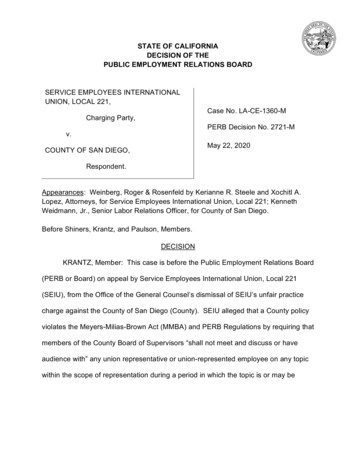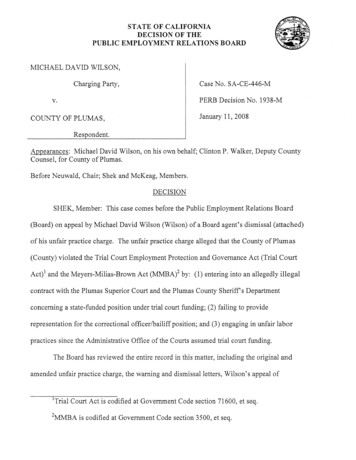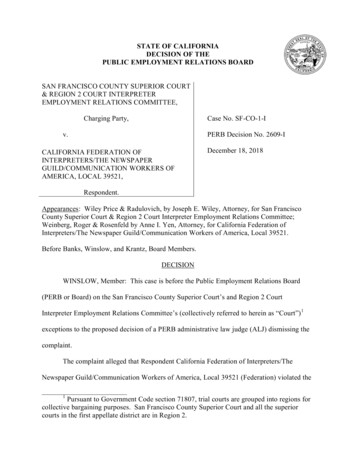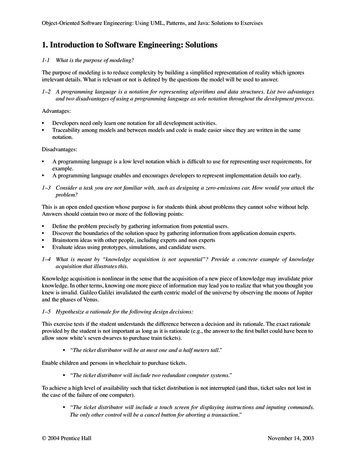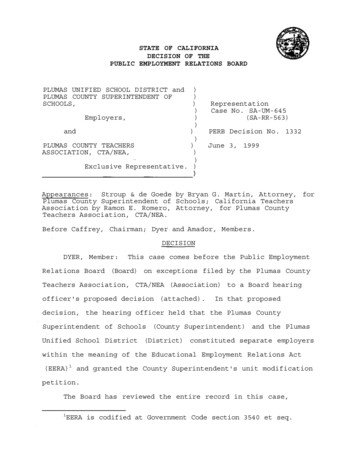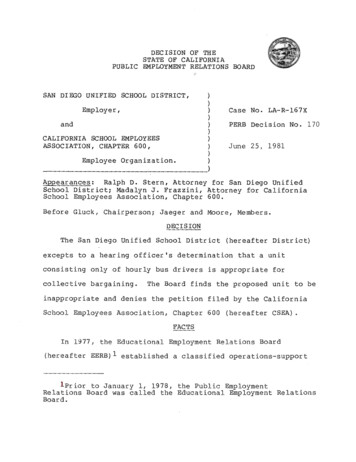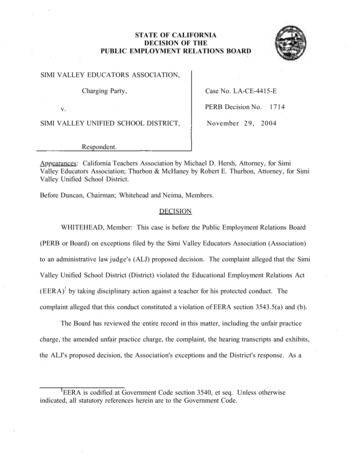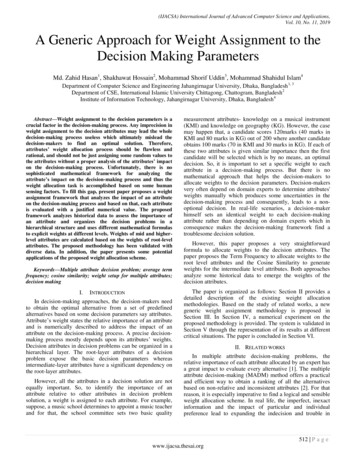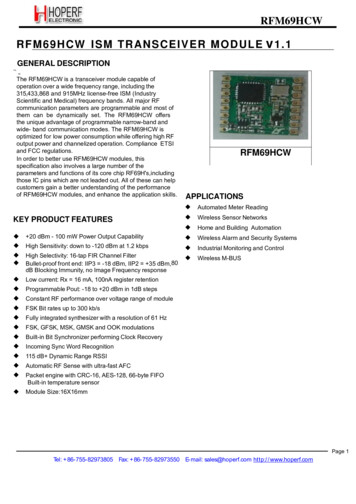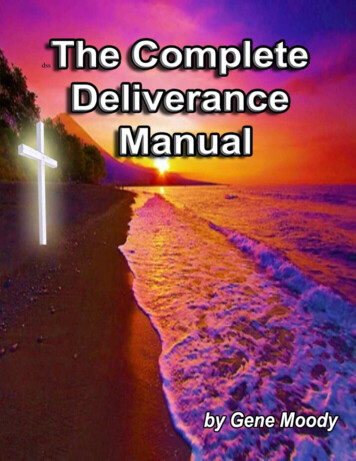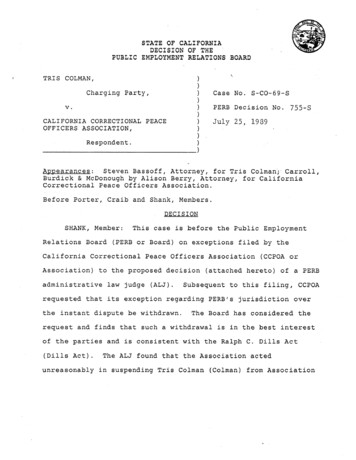
Transcription
STATE OF CALIFORNIADECISION OF THEPUBLIC EMPLOYMENT RELATIONS BOARDTRIS COLMAN,Charging Party,Case No. S-CO-69-SPERB Decision No. 755-S25,July 25,1989CALIFORNIA CORRECTIONAL PEACEOFFICERS ASSOCIATION,Respondent.Appearances: Steven Bassoff, Attorney, for Tris Colman; Carroll,Burdick & McDonough by Alison Berry, Attorney, for CaliforniaCorrectional Peace Officers Association.Before Porter, Craib and Shank, Members.DECISIONSHANK, Member:This case is before the Public EmploymentRelations Board (PERB or Board) on exceptions filed by theCalifornia Correctional Peace Officers Association (CCPOA orAssociation) to the proposed decision (attached hereto) of a PERBadministrative law judge (ALJ) . Subsequent to this filing, CCPOArequested that its exception regarding PERB's jurisdiction overthe instant dispute be withdrawn.The Board has considered therequest and finds that such a withdrawal is in the best interestof the parties and is consistent with the Ralph C. Dills Act(Dills Act) .The ALJ found that the Association actedunreasonably in suspending Tris Colman (Colman) from Association
membership in violation of section 3519.5 (b) of the Dills Actby :(1) finding him guilty, without pre-hearing notice, ofharassing Ms. Lee Wilson at a chapter meeting on August 16, 1986;and (2) submitting to the CCPOA appeals board material which wasnot introduced at Colman's disciplinary hearing and which he hadnot seen before.The Board, after review of the entire record, finds theALJ's findings of fact to be free from prejudicial error andadopts them as its own. We are also in agreement with, andhereby adopt, the conclusions of law set forth in the ALJ'sdecision.CCPOA excepts to the ALJ's exclusion of testimony, offeredat the hearing, of the Association's intent behind the bylawsgoverning discipline of members. We find that the evidence wasproperly excluded since opinions of Association officersThe Dills Act is codified at Government Code section 3512et seq. Unless otherwise indicated, all statutory references areto the Government Code.In relevant part, Government Code section 3519.5 provides asfollows :It shall be unlawful for an employeeorganization to:(b) Impose or threaten to impose reprisalson employees, to discriminate or threaten todiscriminate against employees, or otherwiseto interfere with, restrain, or coerceemployees because of their exercise of rightsguaranteed by this chapter.21986i
concerning the procedure set forth in bylaws would be relevantonly if ambiguity existed, which was not the case here.CCPOA excepts to the ALJ's exclusion of the transcript ofthe disciplinary hearing and pre-hearing settlement conference.We find that the transcript was properly excluded since suchevidence could not cure the two findings of unfairness.CCPOA excepts to the ALJ's consideration of its appealsprocess since the General Counsel's complaint does not contain areference to the appeal, and therefore, there was no notice thatWe find this exception to beit would be a part of the decision.meritless in that CCPOA must have been aware of its ownprocedure, which included the right of a member disciplined bythe Association to appeal.Finally, CCPOA excepts to the ALJ's determination that itfailed to give Colman a fair hearing because it consideredevidence of Colman's conduct at the August 16, 1986 chaptermeeting held nearly two months after charges were filed.CCPOA 'Sargument is that the chapter meeting was called by Colman for thepurpose of censoring Ms. Wilson, so, even though it occurredafter Wilson had filed charges, it was clearly related to thedisciplinary proceeding. The ALJ correctly pointed out that thehearing panel's conclusion on the harassment charge was basedupon evidence about the chapter meeting, which was unrelated toColman was given no noticeany other accusation against Colman.that he would be tried for his conduct at the chapter meeting.Basic fairness would require notice to Colman that such conduct3
would be considered so that he could prepare a defense.Accordingly, we affirm the ALJ's conclusion that the Associationfailed to grant Colman a fair hearing.ORDERBased upon the foregoing findings of fact and conclusions oflaw, and the entire record of this case, the Board finds that theCalifornia Correctional Peace Officers Association (CCPOA) hasviolated section 3519.5(b) of the Ralph C. Dills Act. Pursuantto section 3514.5(c) of the Government Code, it is hereby ORDEREDthat the Association, its board of directors, and itsrepresentatives shall:A.CEASE AND DESIST FROM:Interfering with the protected right of Tris Colman tojoin and participate in the activities of an employeeorganization of his own choosing by unreasonably dismissing himfrom membership in the Association.BTAKE THE FOLLOWING AFFIRMATIVE ACTIONS DESIGNED TOEFFECTUATE THE POLICIES OF THE RALPH C. DILLS ACT:1.Retroactively nullify the hearing panel decisionand order in the matter of Wilson v. Colman, restore lifeinsurance benefits and retroactively rescind the suspension ofTris Colman from membership in the California Correctional PeaceOfficers Association. The hearing panel decision and order maynot be reinstated unless Mr. Colman is afforded a new review ofthe decision by CCOA State Board of Directors.In the event anew review is undertaken, the appellate board shall not considerany materials which were not introduced before the hearing panel.
The appellate board shall not consider the hearing panel'sfinding on Charge 10, harassment, unless a new hearing, uponproper notice, is granted to Mr. Colman regarding the August 16,1986, chapter board meeting and a new finding is sustainedagainst Mr. Colman.2.Within thirty-five (35) days following the datethis Decision is no longer subject to reconsideration, send byUnited States Mail copies of the Notice attached hereto as anAppendix to all members of the CCPOA chapter at the CaliforniaMen's Colony, San Luis Obispo. The Notice must be signed by anauthorized agent of the Association, indicating that theAssociation will comply with the terms of this Order.3.Written notification of the actions taken to complywith this Order shall be made to the Sacramento Regional Directorof the Public Employment Relations Board in accord with theDirector's instructions.Member Craib joined in this Decision.Member Porter's concurrence begins on page 6.5
Porter, Member, concurring: I concur that the CaliforniaCorrectional Peace Officers Association (CCPOA) violated theState Employee-Employer Relations Act.I cannot agree, however,with the holding based on the Public Employment Relations Board(PERB or Board) precedent that an interference violation undersubdivision (b) of Government Code section 3519.5 does notrequire proof of unlawful motive.Government Code section 3519.5 prescribes in pertinent part( emphasis added) :It shall be unlawful for an employeeorganization to:(b) Impose or threaten to impose reprisalson employees, to discriminate or threaten todiscriminate against employees, or otherwiseto interfere with, restrain, or coerceemployees because of their exercise of rightsguaranteed by this chapter.In San Diegueto Unified School District (1977) EERBDecision No. 22, the Board dealt with an identical statutoryprovision contained in the Educational Employment RelationsPrior to January 1, 1978, PERB was known as the EducationalEmployment Relations Board (EERB) .Government Code section 3543.5 provides in pertinent part:It shall be unlawful for a public schoolemployer to:(a) Impose or threaten to impose reprisalson employees, to discriminate or threaten todiscriminate against employees, or otherwiseto interfere with, restrain, or coerceemployees because of their exercise of rightsguaranteed by this chapter [EERA] .(Emphasis added. )
Act (EERA) making it unlawful for a public school employer toretaliate, discriminate, or interfere with employees "because ofThe Board held that the "because of" proviso requiredproof of an unlawful motive to establish a violation.Thereafter, in Carlsbad Unified School District (1979) PERBDecision No. 89, the majority opined that, where there wasinterference with an employee's protected rights, a finding ofan interference violation should not be conditioned on whetherthe employer had an unlawful motive in interfering.Thus, theCarlsbad Board held that it was not necessary to "read" the"because of" proviso as applying to interference violations, andoverruled San Diegueto insofar as it held that proof of unlawfulmotive was required in interference cases. (Carlsbad, supra,p. 5.)In Novato Unified School District (1982) PERB DecisionNo. 210, the Board reaffirmed the Carlsbad holding that proofof unlawful motive was not required to establish an interferenceviolation, but clarified Carlsbad to set forth the so-called"Novato test" to identify the elements necessary to establish areprisal or discrimination violation.The Novato elements are:(1) the employee's exercise of a protected right; (2) theemployer's knowledge thereof; (3) an adverse or discriminatoryaction taken thereafter by the employer against the employee; and(4) proof (by direct and/or circumstantial evidence) that theemployer took the adverse or discriminatory action "because of"
the employee's exercise of the protected right. (Novato, supra,pp . 5-14.)Hence, Carlsbad and Novato hold that, while the "becauseof " proviso requires proof of such unlawful motive to establisha reprisal or discrimination violation, it is somehow notapplicable to an interference violation under the same section.I respectfully disagree.We deal with statutes which prescribe that it is unlawfulfor an entity (employer or employee organization):to impose or threaten to imposereprisals on employees, to discriminate orthreaten to discriminate against employees,or otherwise to interfere with, restrain, orcoerce employees because of their exerciseof rights guaranteed by this chapter.(Gov. Code, secs. 3519.5, subd. (b) and3543.5, subd. (a) , emphasis added. )One of the simplest and most fundamental canons of statutoryconstruction is that a qualifying phrase must be applied to theantecedent words, phrases and clauses to which it relates.(Porto Rico Railway L. & P. Company v. Mor (1920) 253 U.S. 345,348 [64 L. Ed. 944, 946]; Wholesale Tobacco Dealers v. NationalCandy and Tobacco Company (1938) 11 Cal. 2d 634, 659-660;Addison v. Department of Motor Vehicles (1977) 69 Cal. App. 3d 486,496; Kelly v. State Personnel Board (1939) 31 Cal . App. 2d 443,448. ) Moreover, a qualifying phrase must, at a minimum, beconstrued to refer and apply to the antecedent words, phrasesand clauses immediately preceding it. (Krikorian v. Barry (1987)196 Cal. App. 3d 1211, 1218, hg. den. ) Even in cases where anuncertainty or ambiguity exists in the statute, a qualifying8
phrase must be construed as referring to the antecedent words,phrases and clauses immediately preceding it and not to more(Addison v. Department ofremote words, phrases or clauses.Motor Vehicles, supra, 69 Cal . App. 3d 486, 496; Board of PortCommissioners v. Williams (1937 ) 9 Cal. 2d 381, 389; Kelly v.State Personnel Board, supra, 31 Cal . App. 2d 443, 448. )Clearly, subdivision (b) of Government Code section 3519.5(as well as subd. (a) of Gov. Code, sec. 3545.5) may not befragmented so as to separate the immediately preceding antecedent"or interfere with, restrain, or coerce employees" from its, " as the two phrases arequalifying phrase "because ofinextricably tied. (People v. Superior Court (1969) 70 Cal. 2d123, 133; Krikorian v. Barry, supra, 196 Cal. App. 3d 1211, 1218,hg. den. ; Oliva v. Swoop (1976) 59 Cal . App. 3d 130, 138, hg. den. )Furthermore, even apart from fundamental statutory constructionrules, common sense dictates that we cannot simply leapfrog overthe antecedent interference phrase immediately preceding the"because of" proviso and apply the "because of" proviso solelyto the more "remote" reprisal and discrimination phrases.Accordingly, I submit that proof of unlawful motive (e.g. ,that the employee organization interfered with, restrained orcoerced the employee because of the employee's exercise of aprotected right) is a required element of proof to establish9
an interference violation under Government Code section 3519.5,subdivision (b). Carlsbad and Novato should be overruled to theextent that they hold otherwise.In the instance case, the record does not demonstrate thatCCPOA acted with an unlawful intent in interfering with Colman'smembership rights and, therefore, I cannot find a violation ofGovernment Code section 3519.5, subdivision (b) . The record,however, does clearly demonstrate that CCPOA failed to followreasonable procedures in suspending Colman's membership statusand, thus, unlawfully interfered with Colman's membership rightsThe Carlsbad majority's concern was that the application ofthe "because of" proviso to interference violations couldpreclude an employee whose protected rights were interfered withfrom seeking redress unless intentional harm could be shown.This concern did not give the Board license to rewrite thestatute.The Legislature has statutorily imposed an unlawfuldiscrimination motive requirement for reprisal, discrimination,and interferenceviolations under subdivision (b) of Government Code section3519.5, and the Board must adhere thereto.Regarding theCarlsbad majority's concern, where an employee's protected rightsare interfered with and where no unlawful motive exists, arespondent may, nevertheless, be charged with violating thestatute specifically granting such rights to the employee.(Leek v. Washington Unified School District (1981) 124 Cal . App. 3d43, 48-53, hg. den. ; Link v. Antioch Unified School District(1983) 142 Cal. App. 3d 765, 768-769; Mt. Diablo Unified SchoolDistrict (1978) PERB Decision No. 68, pp. 11-13; and see San JoseTeachers Association v. Superior Court (Abernathy) (1985)38 Cal. 3d 839, 844, 861-863, fn. 14 on p. 861, vacated andremanded on other grounds (1986) 475 U.S. 1063, vacated on othergrounds (1986) 42 Cal. 3d 130.The Carlsbad majority's concern perhaps stemmed from thisagency's charging practice of attempting to channel and fit anyand all alleged facts or violations into only those "unlawful"acts proscribed in just two relatively narrow sections of EERA.This Board is not so restricted in enforcing the acts which itadministers. (Leek v. Washington Unified School District, supra,124 Cal . App. 3d 43, 48-49, hg. den. )10
in violation of Government Code section 3515." (Gov. Code, secs.3515 and 3515.5; Union of American Physicians and Dentists(Stewart) (1985) PERB Decision No. 539-S, pp. 4-5; CaliforniaAssociation of Psychiatric Technicians (Long) (1989) PERBDecision No. 745-S, pp. 8-9; California State Employees'Association (Fry) (1986) PERB Decision No. 604-S, p. 4; State ofCalifornia (Department of Youth Authority) (1985) PERB DecisionNo. 535-S, p. 30.)The record before us shows that when Colman filed hisoriginal charges with PERB, the thrust of his charges wastwofold: (1) that respondent CCPOA had improperly suspended hismembership through unreasonable disciplinary procedures; and (2)that respondent CCPOA was discriminating against him in violationof Government Code section 3519.5 in connection with the amountof dues and/or fair share fee being deducted from his paycheckduring the suspension.Government Code section 3515 provides in pertinent part:Except as otherwise provided by theLegislature, state employees shall havethe right to form, join, and participatein the activities of employee organizationsof their own choosing for the purpose ofrepresentation on all matters of employeremployee relations.Respecting the aforesaid employee rights, Government Code section3515.5 provides in relevant part:Employee organizations may establishreasonable restrictions regarding who mayjoin and may make reasonable provisionsfor the dismissal of individuals frommembership.11
Prior to the issuance of the complaint, the dues deductionmatter was resolved.Colman's attorney filed a written requestwith the Board agent requesting that Colman's charges be amended"toeliminate those elements of the charge relating to Hudson"toviolations [the fair share fee matter] and violations of 3515.6,3519.5 and 3515. 7(e) [emphasis added]. " Colman's attorney'sletter concluded:Mr. Colman is still most anxious to pursuethe charge outlined in the first paragraph ofhis complaint concerning CCPOA's unreasonabledenial of membership to him in violation ofGovernment Code section 3515.5.Thereafter, the Board agent issued a complaint which describedthe alleged unreasonable procedures used in suspending Colman'smembership, and charged that such conduct "interferes in ChargingParty's right to membership in a labor organization under"ThisGovernment Code section 3515. " The complaint then stated:conduct violates Government Code section 3519 5(al [emphasisadded ] . "At the beginning of his proposed decision, theadministrative law judge (ALJ) pointed out that there was nothingin the complaint or the underlying charge suggesting a violationof section 3519.5(a). He therefore concluded that reference tothat section was a typographical error, and he amended thecomplaint to allege a violation of section 3519.5(b) .conclusion of his proposed decision, the ALJ found:By suspending Mr. Colman from membership onthe basis of these actions [unreasonabledisciplinary procedures], the Associationinterfered with his right to join and12In the
participate in the activities of an employeeorganization. This action was in violationof Dills Act section 3519.5(b).For the reasons previously set forth, I cannot sustain afinding of a violation of subdivision (b) of section 3519.5.However, I do find that the record amply supports thedetermination that respondent CCPOA did unlawfully interfere withColman's section 3515 rights and, thus, violated section 3515.13
APPENDIXNOTICE TO CHAPTER MEMBERSDISTRIBUTED BY ORDER OF THEPUBLIC EMPLOYMENT RELATIONS BOARDAn Agency of the State of CaliforniaAfter a hearing in unfair practice Case No. S-CO-69-S, TrisColman v. California Correctional Peace Officers Association inwhich all parties had the right to participate, it has been foundthat the California Correctional Peace Officers Association hasviolated section 3519.5(b) of the Ralph C. Dills Act.Association violated the Act by suspending Tris Colman frommembership in the Association upon a finding that was madeThewithout proper notice and an appellate process that denied a fairreview of a hearing panel's decision.As a result of this conduct, we have been ordered to mailcopies of this Notice to all members of the Association chapterat the California Men's Colony, San Luis Obispo, and to abide bythe following.A.We will:CEASE AND DESIST FROM:Interfering with the protected right of Tris Colman toJoinjoinand participate in the activities of an employeeorganization of his own choosing by unreasonably dismissing himfrom membership in the Association.B.TAKE THE FOLLOWING AFFIRMATIVE ACTIONS DESIGNED TOEFFECTUATE THE POLICIES OF THE RALPH C. DILLS ACT:1 . Retroactively nullify the hearing panel decisionand order in the matter of Wilson v. Colman, restore lifeinsurance benefits and retroactively rescind the suspension ofTris Colman from membership in the California Correctional PeaceOfficers Association. The hearing panel decision and order maynot be reinstated unless Mr. Colman is afforded a new review ofthe decision by CCPOA State Board of Directors.In the event anew review is undertaken, the appellate board shall not considerany materials which were not introduced before the hearing panel.The appellate board shall not consider the hearing panel'sfinding on Charge 10, harassment, unless a new hearing, uponproper notice, is granted to Mr. Colman regarding the August 16,1986, chapter board meeting and a new finding is sustainedagainst Mr. Colman.Date :CALIFORNIA CORRECTIONALPEACE OFFICERS ASSOCIATIONByAuthorized Agent
STATE OF CALIFORNIAPUBLIC EMPLOYMENT RELATIONS BOARDTRIS COLMAN,Unfair PracticeCase No. S-CO-69-SCharging Party,v.CALIFORNIA CORRECTIONAL PEACE OFFICERSASSOCIATION,PROPOSED DECISION(12/28/87)Respondent.Appearances :Steven Bassoff, Attorney, for Tris Colman;Neyhart, Anderson, Nussbaum, Reilly & Freitas by &Elaine B. Finegold for the California Correctional PeaceOfficers Association.Before Ronald E. Blubaugh, Administrative Law Judge.PROCEDURAL HISTORYA former union officer contends here that he was suspendedfrom union membership after a hearing marked by proceduralirregularities. In particular, he alleges, the union'spre-hearing notice of allegations was fatally non-specific andthe union's review of his conduct went beyond the pre-hearingallegations. The union responds that the dispute is anentirely internal affair of the union and is not subject toexternal review. Alternatively, the union responds that itspre-hearing notice was procedurally adequate but that if it wasnot, the error was cured by actual notice given to its formerofficer in various written and spoken communications.This proposedp oposed decision has been appealed to theBoardBoard itself andandmaymay not be cited asasprecedentunless the decision and its rationale have beenagopted by the Board.Board.adopted
The charge which commenced this action was filed onApril 10, 1987, by Tris Colman against the CaliforniaCorrectional Peace Officers Association (Association orCCPOA) . A portion of the charge was withdrawn onJune 16, 1987, and on the same day a complaint was issued bythe general counsel of the Public Employment Relations Board(PERB or Board). The complaint alleges that the Associationviolated section 3519.5(a) of the Ralph C. Dills Act by1) failing to provide the charging party with a statement ofcharges containing specific alleged offenses, includinglocations and circumstances, and 2) failing to limit its reviewof allegations to those matters in the statement of charges.1In relevant part, Government Code section 3519.5provides as follows:It shall be unlawful for an employeeorganization to:(a) Cause or attempt to cause the state toviolate section 3519.( b ) Impose or threaten to impose reprisalson employees, to discriminate or threaten todiscriminate against employees, or otherwiseto interfere with, restrain, or coerceemployees because of their exercise ofrights guaranteed by this chapter.There is nothing in the complaint or the underlying chargeeven suggesting a violation of section 3519.5(a) .that the reference to this section in the complaint is aI concludetypographical error and hereby amend the complaint to allege aviolation of section 3519.5(b)2Thee Ralph C. Dills Act (Dills Act) (formerly known asthe State Employer-Employee Relations Act) is found atGovernment Code section 3512 et seq. Unless otherwiseindicated, all statutory references are to the Government Code.2
The Association filed an answer on June 30, 1987, denyingthat it had violated the Dills Act and arguing affirmativelythat PERB had no jurisdiction over internal union matters.hearing was held in Sacramento on September 21, 1987. With thefiling of post-hearing briefs, the matter was submitted fordecision on December 11, 1987.FINDINGS OF FACTThe Respondent, California Correctional Peace OfficersAssociation, is an employee organization under the Dills Act.At all times relevant the Association has been the exclusiverepresentative of State of California Bargaining Unit no. 6,Corrections.Mr. Colman has been a correctional officer since August of1982. He joined the Association shortly after he was employedby the State. During the relevant period, Mr. Colman worked atthe California Men's Colony in San Luis Obispo, a prisonoperated by the State Department of Corrections. At the timeof the events at issue, Mr. Colman was the president of theAssociation's chapter at the California Men's Colony. OnMay 11, 1987, Mr. Colman was promoted to sergeant, a positionoutside the bargaining unit represented by the Association. Aa moonlight job, Mr. Colman has worked for several years as areal estate salesman for the Century 21 office in Santa Maria.The events at issue grew out of a dispute that developedbetween Mr. Colman and the chapter secretary-treasurer,Lee Wilson. Ms. Wilson was appointed secretary-treasurer on3A
February 25, 1986. The secretary-treasurer takes the minutesat chapter meetings, keeps chapter records, pays bills andprovides financial statements at meetings. The person holdingthe post is expected to be knowledgable about chapter business.At the time she was appointed secretary-treasurer,Ms. Wilson requested that the chapter books be brought up todate, audited and turned over to her.On March 25, 1986,Ms. Wilson was given several boxes of chapter records, notincluding checkbooks and financial statements. At Ms. Wilson'srequest the chapter agreed to transfer its checking accountfrom a bank in San Luis Obispo to one in Morro Bay. Despitethe chapter's approval for the switch, Mr. Colman concludedthat the account should be maintained at a more centrallocation and he resisted the transfer.Following a disagreement with Mr. Colman about hiscontinued failure to turn over the books, Ms. Wilson onJune 19, 1986, wrote a letter of complaint to Bob Morgan, theAssociation's state finance committee chairman. In her letter,Ms. Wilson said she wanted "to rectify the existing problem ofour chapter funds, " specifically, the checking account and thebenevolent fund. The benevolent fund was a special accountestablished to assist members in times of ill fortune. Amongits various uses was as a source of personal loans formembers. In her letter, Ms. Wilson asked that "the guidelinesfor chapter funds be restored and adhered to" and, after the
appropriate corrections were made, that she be given control ofthe chapter books. Ms. Wilson sent copies of her letter to thechapter officers.The next day, June 20, 1986, Mr. Colman wrote a letter ofreprimand to Ms. Wilson.In the letter, Mr. Colman accusedMs. Wilson of "deliberate and malicious" conduct toward him.He wrote that she had created conflicts among the Associationleadership and had become a threat to his credibility and thatof the Association."Please consider this to be a formalnotice that I am very concerned regarding your conduct,attitude, and actions towards the other members of this Boardof Directors and myself in particular, " Mr. Colman wrote. Hestated that if Ms. Wilson continued along her "present path" hewould remove her from the chapter board and from her positionas chief job steward for a portion of the prison.Ms. Wilson responded on July 20, 1986, by filing chargesagainst Mr. Colman under the Association's constitution or"Standard Operating Procedure" (SOP) , as it officially isknown .member .The SOP sets out 13 grounds for the discipline of aIn her statement of charges, Ms. Wilson cited twogrounds from Chapter 13 of the SOP:2H) Using the name or assets (includingmailing lists) or goodwill of CCPOA or anychapter in an unauthorized manner;21) Deliberately interfering with anyofficial of CCPOA or any chapter official inthe discharge of his or her lawful duties.5.·
Ms. Wilson's statement of charges against Mr. Colman areset out in the form of a letter to Association SecretaryLarry Corby.The letter describes a series of incidents in arambling discourse. Ms. Wilson did not divide her letter intodiscrete factual allegations and in most instances did notrecite the specifics of the alleged acts of misconduct. Thefailure to recite specific details was inconsistent with theAssociation SOP requirement that:Charges shall be in writing and shall besigned by the member or members bringing thecharge. The charges shall be specific,citing in detail the nature, the date, andthe circumstances of the alleged offense,where the violation of a section shall becited, along with the specific act oromission which constitutes the allegedviolation.Ms. Wilson's letter was not revised or rewritten into aformal accusation by CCPOA staff or officers. At the time ofthis dispute, CCPOA staff attorneys took a strict, hands-offapproach to charges filed by one Association member againstanother.After reviewing the charges, state Association officershired a private investigator to look into the accusations andprepare a report. Mr. Colman was questioned at length by theinvestigator who went substantially beyond the accusations inthe Wilson letter in his questioning. The investigator made nofindings of wrongdoing or illegal activity by Mr. Colman.Two efforts at settlement were made by Associationofficers. The second effort, on September 18, 1986, followed
the completion of the investigator's report. Both Mr. Colmanand Ms. Wilson were permitted to go through the report, one ata time, with the investigator and offer corrections.Thereafter, the parties reached a tentative agreement to try toresolve the dispute informally. However, after two weeks Ms.Wilson rejected the informal process and asked for a fullhearing of her complaint.The hearing on the charges against Mr. Colman was set forNovember 14, 1986. When Mr. Colman learned that the chairmanof his hearing panel was to be an Association officer namedJohn Baird he requested CCPOA President Don Novey to assignsomeone else. Mr. Colman justified his request to remove Bairdbecause he was running against Baird for the position ofstatewide executive vice president. "I believe that it wouldbe unfair to be judged by someone whom I would hope to unseatfrom office a few days later, " Mr. Colman wrote.The requestwas denied by Mr. Novey and Mr. Baird served as chairperson.The hearing commenced on the scheduled date, but at2:00 p.m. instead of the scheduled 9:00 a.m. At the start ofthe hearing Mr. Colman asked Mr. Baird what charges thecommittee would be dealing with. Mr. Baird showed him a copyof Ms. Wilson's letter of July 20 and said that was all.Because of the late start, the hearing continued into theevening. At 8:00 p.m
and order in the matter of Wilson v. Colman, restore life . insurance benefits and retroactively rescind the suspension of Tris Colman from membership in the California Correctional Peace . Officers Association. The hearing panel decision and order may . not be reinstated unless Mr. Colman is afforded a new review of
